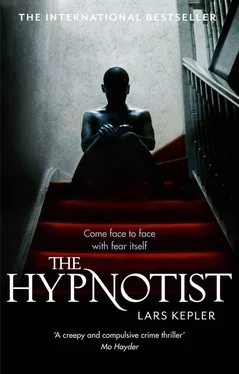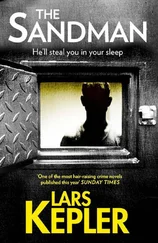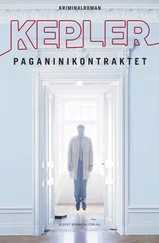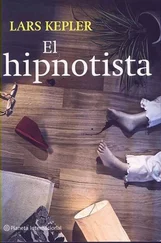Our eyes met. Lydia’s face looked somehow shrivelled, dried up. This was not something I had expected. I still felt cold because of what she had told me. If the rule of confidentiality had to be weighed against the duty of disclosure, this was a case in which it was crystal clear that the obligation to remain silent no longer applied, since a third party was obviously in danger.
“Lydia,” I said quietly, “you understand that I have to contact Social Services?”
“Why?”
“What you told me leaves me no choice.”
“In what way?”
“Don’t you see?”
Lydia drew back her lips. “I didn’t say anything.”
“You described how- ”
“Shut your mouth,” she snapped. “You don’t know me, you have nothing to do with my life, and you have no right to meddle in what I do in my own home.”
“I have reason to suspect that your child- ”
“Shut your mouth!” she screamed, and left the room.
I’d parked next to a high fir hedge three hundred feet from Lydia’s large wooden house in Rotebro. The social worker had agreed to my request to accompany her on the first home visit. My report to the police had been received with a certain amount of scepticism but had, of course, led to a preliminary investigation.
A red Toyota drove past me and stopped outside the house. I got out of the car, walked over, and introduced myself to the short, stocky woman who stood outside the car.
Sodden advertising leaflets were sticking out of the letter box. The low gate stood open. We went up the path to the house. I noticed there were no toys in the neglected garden. No sandbox, no swing in the old apple tree, no bike on the path. It was a sunny day, but all the blinds were closed. The hanging baskets were full of dead plants. A flight of rough stone steps led up to the door. I thought I sensed a movement behind the yellow opaque glass. The social worker rang the bell. We waited, but there was no answer, no sound except birdsong and the intermittent noise of distant traffic. She yawned, looked at her watch, rang the bell again, and tried the handle. The door was not locked. She opened it. We were looking into a small hallway.
“Hello?” she shouted. “Lydia?”
We walked in, took off our shoes, and continued through a door into a passageway with pink wallpaper and pictures of people meditating, with bright light around their heads. There was a pink telephone on the floor next to a hall table.
“Lydia?”
I opened a door and saw a narrow staircase leading to the basement.
“It’s down here,” I said.
The social worker followed me down the stairs and into the rec room, which contained an old leather sofa and a table, the top of which was made up of brown tiles. On a tray stood several scented candles among polished stones and pieces of glass. A deep red rice-paper lantern with Chinese characters on it hung from the ceiling. A plastic mat lay over the floorboards. Against one wall was a door. My heart was pounding as I moved over to it. When I tried to open it, the door got stuck on a large bubble in the plastic mat. I pushed down the bubble with my foot and went inside.
There was no cage. Instead, an upturned bicycle stood in the middle of the floor with the front wheel removed. A repair kit lay beside a blue plastic box: rubber patches, glue, monkey wrenches. One of the shiny hooks had been inserted under the edge of the tyre and braced against the spokes. Suddenly there was a creaking sound from the ceiling, and we realized someone was walking across the floor of the room above. Without exchanging a word we hurried up the stairs. The kitchen door was ajar. I noticed there were slices of bread and crumbs on the yellow linoleum floor.
“Hello?” the social worker called out.
I went in and saw that the fridge door was open. Lydia was standing in the pale glow of the light, her eyes gazing at the floor. Only after a few seconds did I see the knife in her hand. It was a long bread knife with a serrated edge. Her arm was hanging loosely by her side. The knife blade glimmered beside her thigh as her hand shook.
“I don’t want you here,” she hissed, suddenly looking at me.
“All right,” I said, moving backwards toward s the doorway.
“Shall we sit down and have a little chat?” said the social worker, keeping her tone neutral.
I pushed open the door and saw that Lydia was slowly moving closer.
“Erik,” she said. I started to close the door, and Lydia sprang forward. I raced down the hall, but the door at the end was locked. Lydia kept pace, making a strange wailing noise as she ran. I yanked open another door and stumbled into a TV room. Lydia followed me in. I bumped into an armchair as I made for the balcony door, but it was impossible to turn the handle. Lydia flew at me with the knife, and I took cover behind a large oval table.
“It’s your fault,” she said, as she chased me this way, that way, around the table.
The social worker ran into the room. She was completely out of breath. “Lydia,” she said sharply. “Stop this right now.”
“It’s all his fault,” said Lydia.
“What do you mean?” I asked. “What’s my fault?”
“This,” said Lydia, drawing the knife across her throat. She looked into my eyes as the blood splashed down over her dress and her bare feet. Her mouth was trembling. The knife fell to the floor. One hand groped for support, but she sank down to the floor, coming to rest, balanced on one hip, like a mermaid.
Annika Lorentzon’s smile was troubled. Rainer Milch leaned across the table and poured a glass of mineral water with a hiss of carbon dioxide. His cuff links flashed royal blue and gold.
“I’m sure you understand why we wanted to speak to you as soon as possible,” said Peter Mälarstedt, adjusting his tie.
I opened the folder they had handed to me. Identical materials sat before each board member. The contents of the folder stated that Lydia had made a complaint against me. She claimed that I had driven her to attempt suicide by coercing her to confess to things that had not taken place. She accused me of having used her for the purposes of my experiments and implanted false memories in her mind during deep hypnosis, and she said I had persecuted her ruthlessly and cynically in front of the others until she was completely shattered and had suffered severe emotional distress.
I looked up from the papers. “Is this some kind of joke?” I said.
Annika Lorentzon looked away. Svein Holstein’s face was completely expressionless as he said, “She’s your patient, and these are serious accusations.”
“I don’t want to accuse a very disturbed patient of lying,” I said angrily, “but she’s either lying or she’s delusional. It’s impossible to implant memories during hypnosis. I can lead them to a memory, but I can’t create one. I lead them up to doors, but I can’t open those doors on my own.”
Rainer Milch looked at me, his expression grave. “The suspicion alone could destroy all your research, Erik, so I’m sure you realize how critical this is.”
I shook my head irritably. “Under hypnosis, she related events concerning herself and her son that I considered so serious I felt I had no choice but to contact Social Services. The fact that she would react in this way was- ”
Ronny Johansson interrupted me sharply. “But she hasn’t even got any children. It says so here.” He tapped on the folder with a long finger. I snorted and got a strange look from Annika.
“Erik, being arrogant in this situation is not particularly helpful,” she said quietly.
“From the very first day she walked into this hospital, her relationship with her son has been the focus of almost every remark,” I said, with an irritable smile. “And not only in a therapeutic context. Whenever she chats with the others, she- ”
Читать дальше
Конец ознакомительного отрывка
Купить книгу












